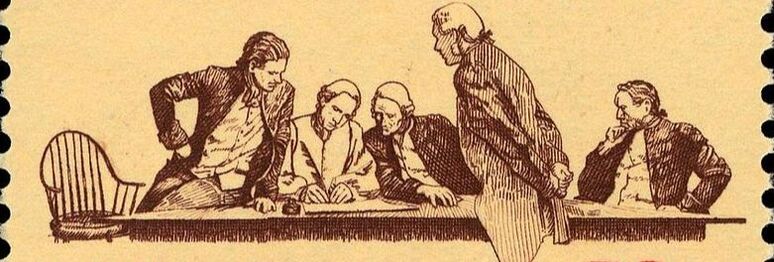|
On Sunday, June 24, 1787, the forty-five year old pastor of the First Congregational Church of Ipswich Hamlet in Massachusetts set off alone in his one-horse shay. The Yale educated man of immense curiosity and resolve carried a cabinet with him to save botanical specimens he encountered on his trip. His mission, however, was not so much scientific as it was political. He was headed to meet with the Congress of the Confederation in New York City, the body that governed America before the Constitution was adopted in 1789. His name was Manasseth Cutler and he had a big proposal for the young Congress. Negotiations at the close of the American Revolution had resulted in the transfer of England's claim to the Northwest Territory to the American nation. Cutler and several partners had a plan for this territory, an area larger that the territory of the entire 13 States that sat north of the Ohio River to the Great Lakes and west to the Mississippi . His request was two-fold, for Congress to adopt laws governing the territory and to sell a portion of the land to a stock company he represented. The first requirement was critical to his group and to the many Continental Army veterans who looked to this uncharted territory as an opportunity to experience what would later become known as the American Dream. Washington and Jefferson both knew the importance of establishing rules to govern the new territory and supported efforts in the Congress to develop those rules. Jefferson even submitted a proposed charter that was not adopted. Interestingly, his proposal included a prohibition of involuntary servitude in the new territory, a system his livelihood depended on. Cutler and his partners had their own ideas about what an ordinance governing the territory needed to include. He and a group of ten men led by Revolutionary War General Rufus Putnam met on March 1, 1786, in the Bunch of Grapes tavern in Boston to formulate a plan for settlement of the territory. They established the Ohio Company to raise funds to acquire land for settlement and chose Cutler to represent them before the Confederation Congress. The group believed strongly that for settlement to succeed, Congress needed to adopt a governing ordinance that would establish their legal ownership of land purchased and provide a set of rules designed to encourage and support a healthy society. Among their requirements were freedom of religion, encouragement of schools and the means of education, good faith interactions with the Indians, and the prohibition of slavery and involuntary servitude from the territory. Cutler took the Ohio Company's plan to Congress with an offer, when combined with another interested developer, of $3.5 million to purchase property in the Northwest Territory if an Ordinance governing the territory could be adopted that fulfilled their requirements. In a debt-ridden new nation, this sum, the equivalent of more than $120 billion in today's dollars, was a strong incentive for its Congress to act. Still, there was opposition. Some feared mass exodus of citizens from their States while others objected to excluding slavery from the territory. Counter proposals were proposed which Cutler found unacceptable. Cutler left New York without an Ordinance to visit Philadelphia, where many influential legislators were working on a new Constitution to create a more powerful and stable United States. His meetings there included the eminent Benjamin Franklin and the noted physician and Jefferson correspondent Benjamin Rush. On his return to New York, Cutler continued to advocate for the ordinance the Ohio Company but to no avail. He finally notified legislators that he would leave New York empty handed that afternoon. This very real prospect of losing the revenues from a proposed sale of territory land evidently inspired the necessary spirit of compromise among the legislators. Before Cutler could leave, he was informed Congress had adopted a ordinance to govern the territory that was based largely on the Massachussets State Constitution. The new Northwest Ordinance included all of the Ohio Company requirements. The territory would recognize freedom of religion, encourage education and the means of providing it (every town would set aside property for a school-house and a university), Indian relations would be conducted in good faith, and slavery would be prohibited. Congress authorized its Treasury to close the sale of 5,000,000 acres to the two companies interested in purchasing land, with the Ohio Company acquiring 1,500,000 of those acres. Cutler returned to his church and only managed to visit the new settlement that followed his negotiations once in his lifetime. The first town established by the Ohio Company would be at the confluence of the Muskingum and Ohio rivers and would be named Marietta to honor the French Queen Marie Antoinette who, it was commonly believed, had done much to persuade Louis XVI to support the American cause during the Revolution. So, if you have wondered what real estate developers have ever contributed to the well being and prosperity of the United States, you now have your answer. But, of course, Manasseth Cutler was much more than a developer. He was an highly educated man, a preacher, a physician, a veteran, and someone who was deeply invested in providing opportunity for American citizens. Image above from a stamp. It depicts the signing of the Articles of Confederation.
The venture moola blog comes to you from Atlanta, Georgia. Find it at readjanus.com. Copyright Clinton Richardson.
Comments are closed.
|
the blog
Travel, history, and business with original photos.
your hostClinton Richardson - author, photographer, business advisor, traveler. Categories
All
Archives
July 2023
Follow us on Facebook
|
Check out Ancient Selfies a 2017 International Book Awards Finalist in History and 2018 eLit Awards Gold Medal Winner and
Passports in his Underpants - A Planet Friendly Photo Safari a 2020 Readers' Favorite Winner in Nonfiction
Site Copyright 2024 by Clinton Richardson

 RSS Feed
RSS Feed